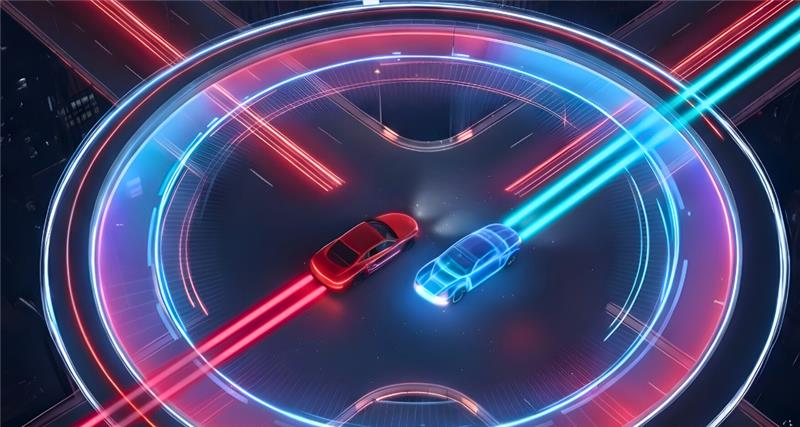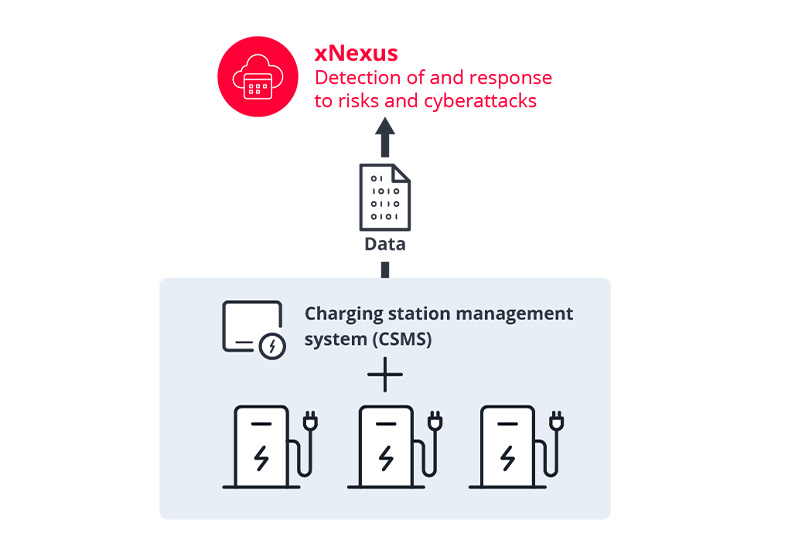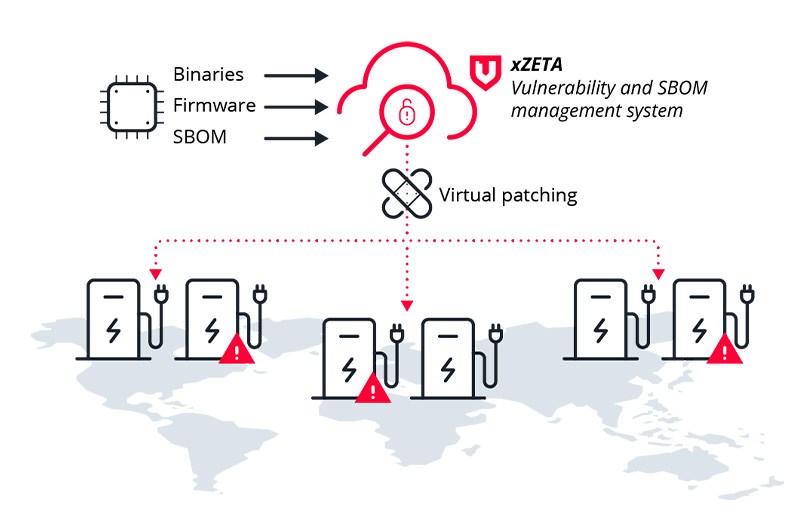EV Charger Risks: Battling Service Outage
EV charger–related cases accounted for 8% of automotive security incidents that occurred between mid-2022 and mid-2023.* Such cases could lead to service and grid disruptions, which is why certain countries have established cybersecurity standards and regulations for EV charging systems, such as NIST IR 8473 and ETSI EN 303 645.
Our solutions provide robust cybersecurity to ensure continuous operation of electric vehicle supply equipment (EVSE) or charging systems. Going beyond Secure by Design, VicOne’s EV Charging System Protection continuously identifies and mitigates vulnerabilities, safeguarding charging stations from unknown risks throughout their life spans.
*Source: VicOne Automotive Cyberthreat Landscape Report 2023
Timely Detection of and Response
to Security Risks and Cyberattacks
Non-Intrusive Integration
Ensure Early Protection With No Hardware Change Required
Our intrusion-free cloud-based XDR platform, xNexus, enables timely detection of and response to security risks and cyberattacks, without requiring hardware changes. Combining human-led investigation and GenAI-assisted analysis across day-to-day activities, our solutions provide early risk warnings, safeguarding charging stations from risks throughout their life spans.
Unique Zero-Day Insights
Continuously Identify Vulnerabilities and Malicious Objects
As EVSE cyberthreats continue to evolve, it is crucial to maintain continuous monitoring for vulnerabilities and malicious objects, such as zero-day vulnerabilities, advanced persistent threats (APTs) and ransomware.* Our solutions allow you to do just that on the binaries, firmware, or software bill of materials (SBOM) of your EV chargers. Upon detection of a vulnerability, our solutions implement virtual patching* in conjunction with the security agent at the edge to prevent exploitation. This approach enables you to protect your systems without having to make changes, providing an average of 102 days of protection while waiting for a vendor patch.
*Patent pending
Resistance to Cyberattacks
Enable Immediate Detection and Blocking of Attacks
Our solutions work to your advantage even if your EV charging systems are already in operation. By integrating our software-based security agent into your charging points or controllers in advance, your EV charging systems gain the ability for immediate detection and blocking of attacks, including denial-of-service (DoS) attacks. It also implements virtual patching* to prevent exploits by enforcing multiple layers of security policies and rules. Moreover, it blocks unauthorized applications from running on chargers by validating them through an approved application list.
*Patent pending
Award-Winning, Complete EV Charging System Protection
Our partnership with VicOne will enable our customers to comply with the highest standards of international regulations and quickly deploy safe and efficient charging infrastructure.
Read Press Release
Why VicOne’s EV Charging System Protection?
True
Compliance
Our solutions facilitate compliance with the NIST IR 8473 cybersecurity framework profile, the ETSI EN 303 645 and ISA/IEC 62443 cybersecurity standards, and the UK’s EV smart charging regulations.
Global Leader in Vulnerability Discovery
Backed by Trend Zero Day Initiative™ (ZDI),* VicOne provides full vulnerability coverage across IT, OT, and automotive. We have also disclosed 49 zero-day vulnerabilities related to EV chargers and connected cars.
*No. 1 in vulnerability discovery since 2007
Source: Omdia Research: Quantifying the Public Vulnerability Market: 2022 Edition
102-Day Early Protection
Our security agent deploys virtual patches* or IPS rules, giving you an average of 102 days of protection while waiting for a vendor patch to become available.
*Patent pending
Open Source
Security Expert
As a member of the Open Source Security Foundation, a part of the Linux Foundation, VicOne works to improve the security of open-source software for the automotive industry.
Awards We’ve Won
Know More From Our Resources
Gain Insights Into Automotive Cybersecurity
- Read More
 Threat ReportsFebruary 11, 2026From overlapping risk domains in an evolving threat landscape to emerging AI-driven cyberattacks, we examine the critical crossroad facing the auto...
Threat ReportsFebruary 11, 2026From overlapping risk domains in an evolving threat landscape to emerging AI-driven cyberattacks, we examine the critical crossroad facing the auto...



